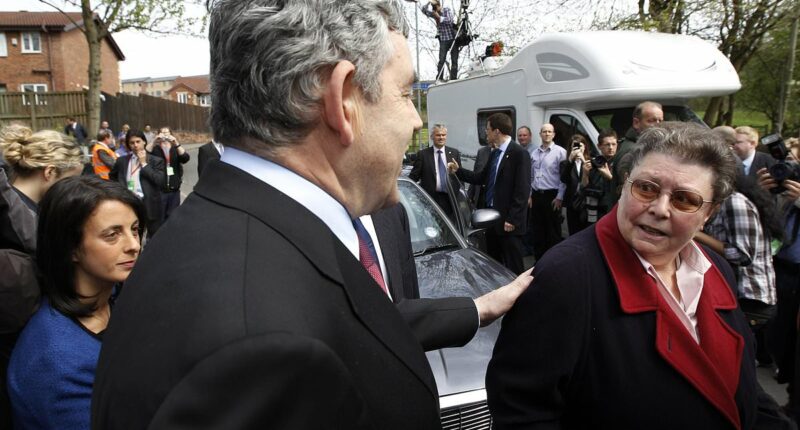Share this @internewscast.com
It was supposed to be the speech that would save Keir Starmer’s career.
The speech intended to convince both critics and supporters that he was capable of leading Labour into the upcoming general election. It was a ‘do or die’ moment meant to finally define the Prime Minister’s leadership.
Instead it was a speech that started to fall apart almost as soon as the cheers in the Liverpool conference hall had died away.
Instead of ushering in a new era for Labour, it recalled memories of one of the party’s biggest general election missteps in recent history—when Gordon Brown dismissed Gillian Duffy’s immigration concerns, a working-class pensioner he met during the 2010 campaign trail in Rochdale.
Thinking he was out of earshot, Brown was overheard referring to her as a ‘bigoted’ woman. He later apologised, but only because he was caught in the act.
Now, 15 years later, it is Sir Keir who has been caught in a similar situation—and it has entirely undercut the carefully crafted message by his team of special advisers and party organizers in that conference speech.
A message designed to reverse the tide of support flowing away from Labour towards its opponents on the political Right.
In his speech, Sir Keir recounted to delegates how, during a visit to the Oldham by-election in 2015, he met Joyce Todd, a working-class woman and lifelong Labour supporter.
She invited him into her home, he recalled, going to great lengths to assure him she was not racist—showing him pictures of her at her Asian neighbor’s wedding—before expressing concerns about the troubling behavior of some new arrivals from Eastern Europe in her area.

In the Liverpool Labour conference speech, Sir Keir told delegates of how he had met Joyce Todd, a working-class woman and lifelong Labour voter

Mrs Todd, whose encounter with the future Prime Minister a decade ago should have provided his audience with proof of how Labour has changed, has furiously denounced him

Gordon Brown dismissed the concerns about immigration of Gillian Duffy, a working-class pensioner he encountered on the campaign trail in Rochdale in 2010
Sir Keir told conference: ‘Then I realised what was really happening. A Labour voter felt that she had to prove to a Labour politician that she wasn’t racist before she could even bring up the issues in her community.
‘I carried that with me through all the bad years, conference: we are a party that patronised working people and that is why we changed the party.’
It should have been an important epiphany. Because of course he was right: the Labour Party, of which I was a member for 34 years – 14 of them as an MP – has(itals) patronised working-class people. And working-class people are abandoning Labour in droves as a result.
But in Sir Keir’s case, it does not seem to have been an epiphany at all.
Because if you’re searching for a definition of ‘patronising’, how about the complacent assumption that a working-class Oldham woman would be happy to be quoted in a high-profile speech without anyone checking to see if she was actually still a Labour supporter?
It turns out she isn’t.
Mrs Todd, whose encounter with the future Prime Minister a decade ago should have provided his audience with proof of how Labour has changed, has furiously denounced him and pledged never to vote for the party in the future.
‘I don’t believe a word [Keir Starmer] says. I’m sorry. I was brought up Labour. My parents were Labour. But I will never vote for them again,’ she said after Sir Keir’s speech to the party faithful.
This whole mess is one of Labour’s own making.
Coupled with Gordon Brown’s appallingly rude response to Gillian Duffy in Rochdale all those years ago, the episode shows how in the space of a century Labour has gone from a party founded by the working classes to one that is ashamed of them. Even if as it desperately chases their votes.
Sir Keir may finally have woken up to the threat decades of neglect has caused to Labour’s traditional voter base.
But his conference speech tells he has not changed. While Mrs Todd’s response to it shows it is too late to repair the damage.
Tom Harris is a former Labour MP

















